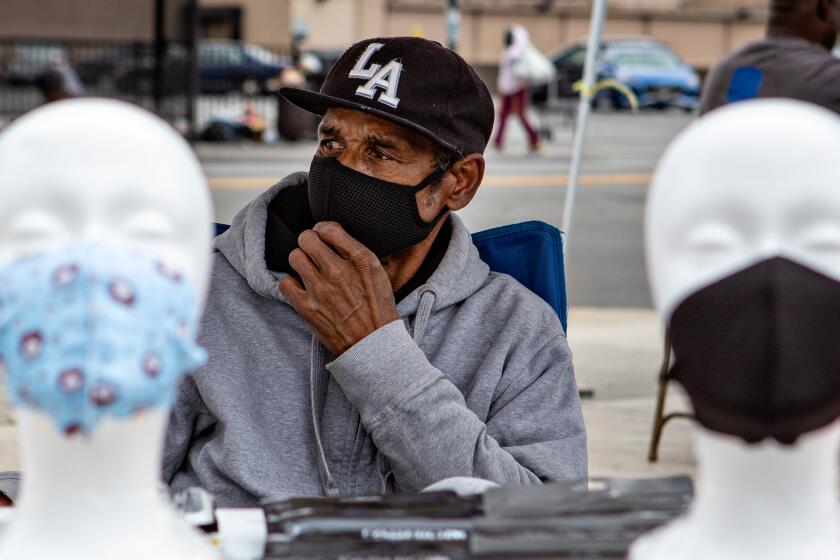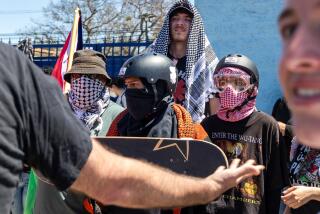Masking up to stop coronavirus isn’t so easy for many of L.A.’s homeless residents
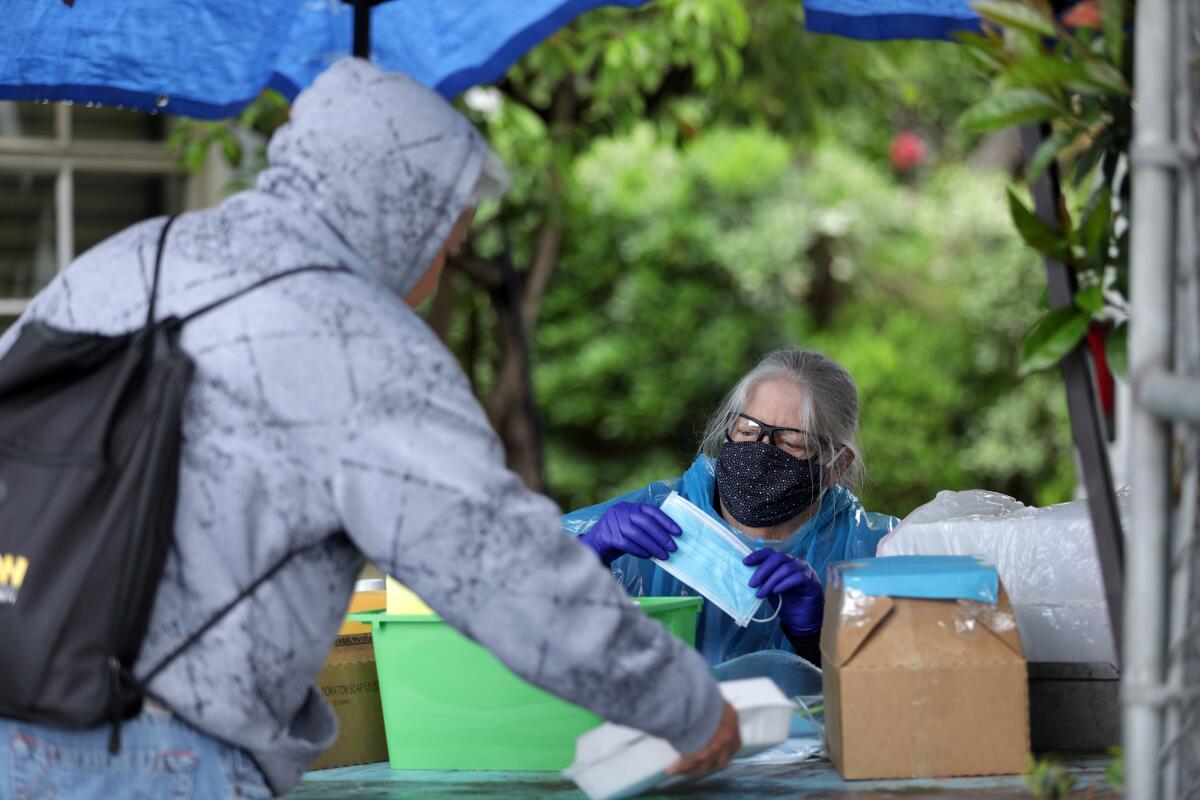
- Share via
To slow the spread of the coronavirus, Los Angeles City Councilman Paul Koretz argued this week, the city should insist that Angelenos don some sort of mask whenever they leave their homes — even if it’s “a rag and a couple of rubber bands.”
“I don’t think there’s anybody that doesn’t have that,” Koretz said at a City Council meeting, his nose and mouth swathed by a butterscotch-yellow bandanna to make his point. “Even homeless people all have rags in their possessions.”
But homeless people and their advocates say masking up is easier said than done for tens of thousands of people living on Los Angeles streets. Getting even a makeshift mask — and keeping it clean enough to be sanitary — has been difficult for many, despite efforts to MacGyver coverings out of T-shirts, scarves, shoelaces and other odds and ends.
Requiring masks or other facial coverings “sounds good. It sounds like something that you would want everybody to cooperate with,” said Pete White, executive director of the skid row-based Los Angeles Community Action Network. “But there’s no way, without the government handing out masks, that people are going to be able to comply.”
Earlier this week, Mayor Eric Garcetti ordered Angelenos to put on facial coverings when they go to groceries, drugstores and many other businesses, a move meant to prevent people from spreading the virus to others. He encouraged people to visit a website to buy cloth masks from local manufacturers or to simply use their own bandannas or scarves to cover up, stressing that medical-grade masks are needed for health workers.
Effective Friday, Los Angeles workers and residents must wear a mask, bandanna or other type of face covering while at essential businesses under an order from Mayor Eric Garcetti.
The Los Angeles Homeless Services Authority said its outreach workers have been handing out masks in recent weeks but could not immediately say how many had been distributed.
Garcetti spokesman Alex Comisar said Thursday that the city would soon begin distributing 35,000 cloth masks to homeless people, including 5,000 slated for skid row and 30,000 that outreach workers with the homeless services authority will hand out across Los Angeles County, funded by philanthropic donations.
As of Thursday, however, homeless people and their advocates said masks remained scarce in many neighborhoods. In a Chatsworth encampment, homeless resident Rita Dunn said she hadn’t seen people wearing masks or other coverings.
“I haven’t seen a single person wearing a mask at an encampment,” said Cristina Fariaz, a volunteer with the outreach and advocacy group Street Watch LA who routinely visits San Fernando Valley sites. In many cases, people haven’t heard the latest guidance from health officials, Fariaz said. One homeless person told her, “My phone has been dead for a week.”
“They heard what was in the news a few weeks ago — that masks don’t matter,” Fariaz said, referring to the shifting guidance around facial coverings over the last month. The Centers for Disease Control and Prevention changed its advice last week amid concerns that seemingly healthy people were spreading the virus to others.
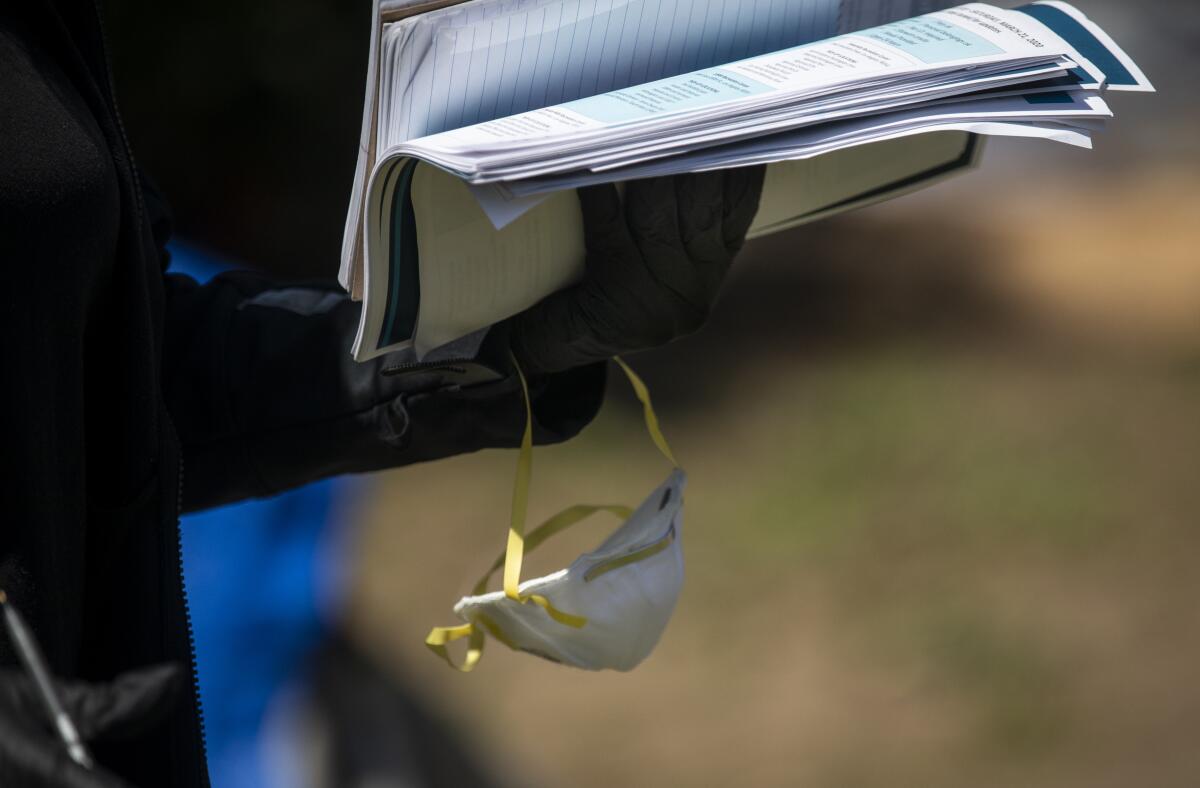
Theo Henderson, who hosts the “We the Unhoused” podcast about the experiences of people living on the street, said that among the unhoused people he saw riding an L.A. bus Wednesday, “not one of them had a mask on.”
“No one talked to them in depth about COVID-19,” Henderson said, pointing out that many of the places where homeless people routinely charge their phones, such as coffee shops, are now closed.
He was upset with what Koretz said about people being able to use rags, pointing out that many unhoused people are “out in the elements.”
If a mask is wet or dirty, “what good is that going to do?” Henderson asked.
Community groups and nonprofits have tried to help: In the San Fernando Valley, Pastor Kathy Huck from the outreach group About My Father’s Business has ordered masks on Amazon and said she had gotten a small grant to fashion masks out of bandannas to hand out. Along skid row, the Union Rescue Mission has handed out thousands of masks to its staff, security and guests, many of them donated, said the Rev. Andy Bales, its chief executive.
“We will need a constant supply to make it through this difficult and overwhelming time,” Bales said.
And White said the Los Angeles Community Action Network has also been handing out donated masks, many of them fashioned out of cloth by volunteers. “Ninety-five percent of people don’t have things to cover up with,” White said Wednesday, upon walking out of his office on skid row. If they do have facial coverings, they’re “dirty as all get out.”
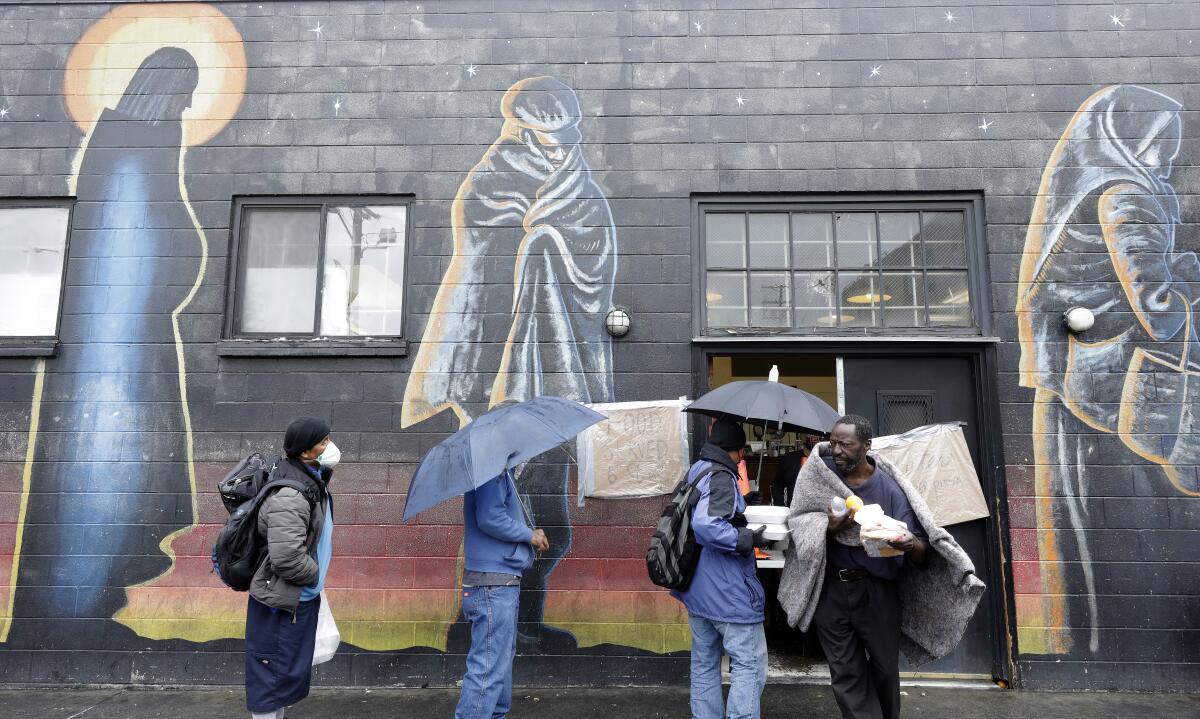
The California Department of Public Health recommends frequent washing for cloth masks — at least daily, and ideally after each use — and Los Angeles Homeless Services Authority outreach workers have been advising people to throw out their cloth masks after using them if they cannot be washed.
Laundromats are still open as essential businesses, but regularly visiting them can be difficult for people who fear stepping away from their tents and belongings, especially in the recent rains, advocates say.
Garcetti said this week that “our idea is not to be arresting and fining people for the face coverings,” but under his order, people can be turned away from laundromats and other businesses, including groceries and convenience stores, if their faces are uncovered.
That troubles Matt Harper, a member of the Los Angeles Catholic Worker’s Hippie Kitchen, which serves meals and recently started handing out masks on skid row.
Harper worries that if businesses refuse them entry, homeless people without masks could be prevented from buying basic things they need. “I worry what these rules will mean for this already stigmatized and struggling community,” Harper said.
More to Read
Sign up for Essential California
The most important California stories and recommendations in your inbox every morning.
You may occasionally receive promotional content from the Los Angeles Times.
